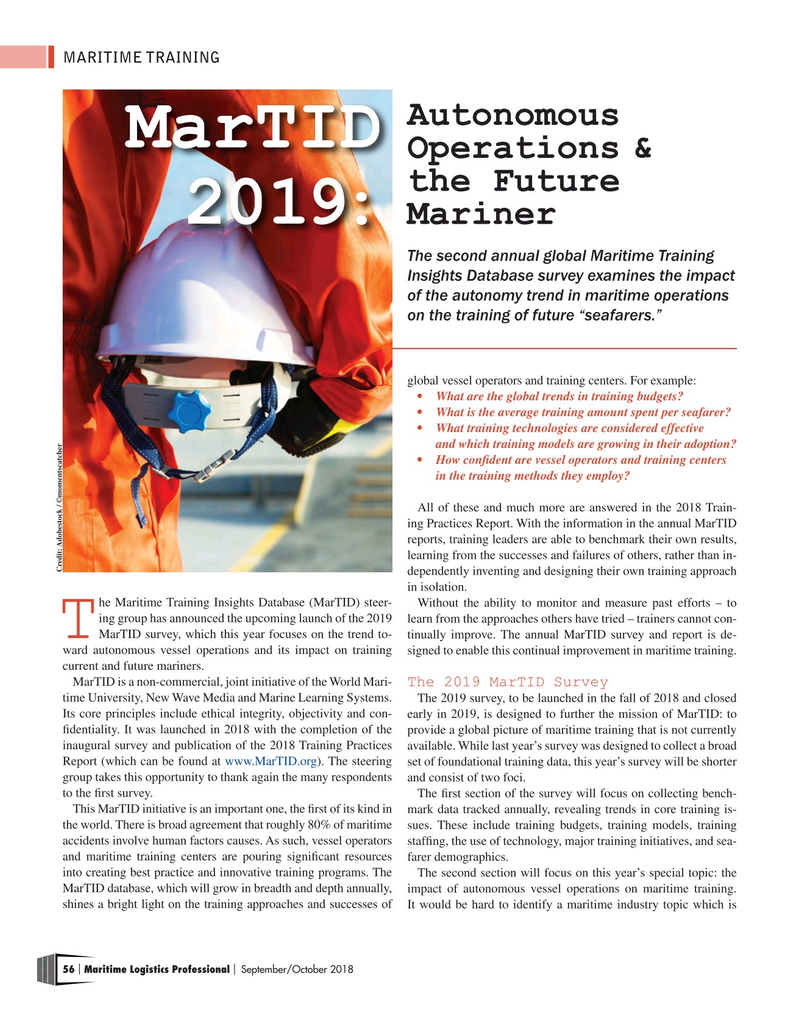
Page 56: of Maritime Logistics Professional Magazine (Sep/Oct 2018)
Liner Shipping & Logistics
Read this page in Pdf, Flash or Html5 edition of Sep/Oct 2018 Maritime Logistics Professional Magazine
MARITIME TRAINING
MarTID
Operations Autonomous & the Future 2019:
Mariner
The second annual global Maritime Training
Insights Database survey examines the impact of the autonomy trend in maritime operations on the training of future “seafarers.” global vessel operators and training centers. For example: • What are the global trends in training budgets? • What is the average training amount spent per seafarer? • What training technologies are considered effective and which training models are growing in their adoption? • How confdent are vessel operators and training centers in the training methods they employ?
All of these and much more are answered in the 2018 Train- ing Practices Report. With the information in the annual MarTID reports, training leaders are able to benchmark their own results, learning from the successes and failures of others, rather than in-
Credit: Adobestock / ©momentscatcher dependently inventing and designing their own training approach in isolation. he Maritime Training Insights Database (MarTID) steer- Without the ability to monitor and measure past efforts – to ing group has announced the upcoming launch of the 2019 learn from the approaches others have tried – trainers cannot con-
TMarTID survey, which this year focuses on the trend to- tinually improve. The annual MarTID survey and report is de- ward autonomous vessel operations and its impact on training signed to enable this continual improvement in maritime training.
current and future mariners.
MarTID is a non-commercial, joint initiative of the World Mari-
The 2019 MarTID Survey time University, New Wave Media and Marine Learning Systems. The 2019 survey, to be launched in the fall of 2018 and closed
Its core principles include ethical integrity, objectivity and con- early in 2019, is designed to further the mission of MarTID: to fdentiality. It was launched in 2018 with the completion of the provide a global picture of maritime training that is not currently inaugural survey and publication of the 2018 Training Practices available. While last year’s survey was designed to collect a broad
Report (which can be found at www.MarTID.org). The steering set of foundational training data, this year’s survey will be shorter group takes this opportunity to thank again the many respondents and consist of two foci. to the frst survey. The frst section of the survey will focus on collecting bench-
This MarTID initiative is an important one, the frst of its kind in mark data tracked annually, revealing trends in core training is- the world. There is broad agreement that roughly 80% of maritime sues. These include training budgets, training models, training accidents involve human factors causes. As such, vessel operators staffng, the use of technology, major training initiatives, and sea- and maritime training centers are pouring signifcant resources farer demographics.
into creating best practice and innovative training programs. The The second section will focus on this year’s special topic: the
MarTID database, which will grow in breadth and depth annually, impact of autonomous vessel operations on maritime training. shines a bright light on the training approaches and successes of It would be hard to identify a maritime industry topic which is 56 Maritime Logistics Professional September/October 2018 | |

 55
55

 57
57
